Related Research Articles
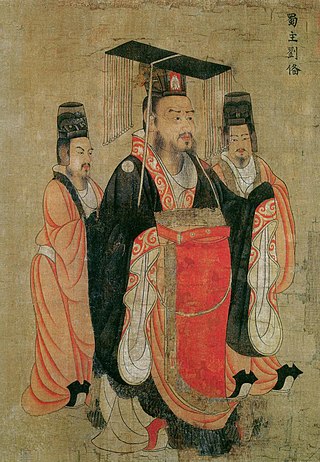
Liu Bei,courtesy name Xuande (玄德),was a Chinese warlord in the late Eastern Han dynasty who later became the founding emperor of Shu Han,one of the Three Kingdoms of China.

Zhuge Liang,also commonly known by his courtesy name Kongming,was a Chinese statesman,strategist,and inventor who lived through the end of the Eastern Han dynasty and the early Three Kingdoms period (220–280) of China. During the Three Kingdoms period,he served as the Imperial Chancellor of the state of Shu Han (221–263) from its founding in 221 and later as regent from 223 until his death in September or October 234.

Gan Ning,courtesy name Xingba,was a Chinese military general serving under the warlord Sun Quan in the late Eastern Han dynasty. Originally a notorious pirate,he gave up the life of a marauder in the late 190s and became a subordinate of Huang Zu,the Administrator of a commandery in present-day east-central Hubei. Disheartened by Huang Zu's indifferent attitude towards him,Gan Ning eventually left Huang and made his way into Wu territory,where he found his calling and became a military officer under the warlord Sun Quan. Throughout his years of service under Sun Quan until his death,Gan Ning fought in numerous battles for his lord,including the battles of Jiangxia (208),Red Cliffs (208–209),Xiaoyao Ford (214–215) and Ruxu (217).
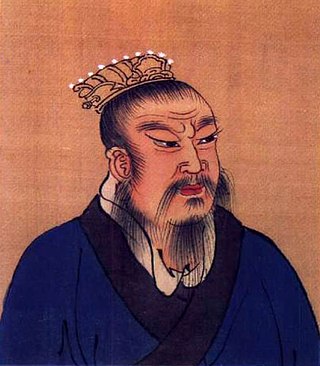
Emperor Gaozu of Han,also known by his given name Liu Bang (劉邦),was the founder and first emperor of the Han dynasty,reigning from 202 to 195 BC. He is considered by traditional Chinese historiography to be one of the greatest emperors in history,credited with establishing the Pax Sinica,one of China's longest golden ages.
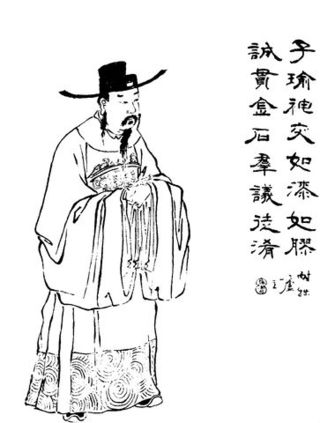
Zhuge Jin,courtesy name Ziyu,was a Chinese military general and politician of the state of Eastern Wu during the Three Kingdoms period of China. Born in the late Eastern Han dynasty,Zhuge Jin started his career in the 200s as an official under the warlord Sun Quan,who later became the founding emperor of Eastern Wu in the Three Kingdoms period. In 215,he served as Sun Quan's representative in a territorial dispute over southern Jing Province between Sun Quan and his ally,Liu Bei. In 219,he joined Sun Quan's general LüMeng in an invasion of Liu Bei's territories in Jing Province after Sun Quan broke the Sun–Liu alliance. He was subsequently appointed as a general and commandery administrator. Before the Battle of Xiaoting of 221–222,Zhuge Jin attempted to dissuade Liu Bei from going to war with Sun Quan but was unsuccessful. The battle ultimately concluded with victory for Sun Quan's side;both sides made peace later and reestablished an alliance between the Eastern Wu and Shu Han states against their rival state,Cao Wei. From 222 until his death in 241,despite being rather incompetent in military affairs,Zhuge Jin served as one of Eastern Wu's top generals and participated in some battles against Cao Wei forces.

Zhang Zhao (156–236),courtesy name Zibu,was a Chinese calligrapher,essayist,military general,and politician. He served as an official of the state of Eastern Wu during the Three Kingdoms period of China. Born in the late Eastern Han dynasty,Zhang Zhao started his career as a scholar in his native Xu Province before the chaos towards the end of the Eastern Han dynasty forced him to flee south to the Jiangdong region for shelter. In Jiangdong,Zhang Zhao became an adviser to the rising warlord Sun Ce. After Sun Ce's death in the year 200,Zhang Zhao played a key supporting role to Sun Ce's younger brother and successor,Sun Quan,as he consolidated power and his control over the Jiangdong territories. In 208,Zhang Zhao strongly urged Sun Quan to surrender to Cao Cao,a rival warlord,because he believed that they stood no chance against an impending invasion by Cao Cao. However,Sun Quan refused to listen to Zhang Zhao and instead heeded the advice of Lu Su and Zhou Yu. Sun Quan's forces ultimately scored a decisive victory over Cao Cao at the Battle of Red Cliffs in the winter of 208. From 200 until his death in 236,Zhang Zhao served under Sun Quan through the collapse of the Eastern Han dynasty and into the Three Kingdoms period after Sun Quan became the founding emperor of the Eastern Wu state. Throughout his career,Zhang Zhao was known for being a stern,uncompromising and intimidating figure who commanded respect from both his colleagues and Sun Quan. Despite Zhang Zhao's seniority and experience,Sun Quan passed him over twice as a candidate for the position of Imperial Chancellor in 222 and 225 as he believed that Zhang Zhao was so headstrong and stubborn that he would not be able to effectively lead the administration. Nevertheless,Sun Quan paid his due respects to Zhang Zhao as a mentor-like figure who saw him through his formative years to his accession to the throne.
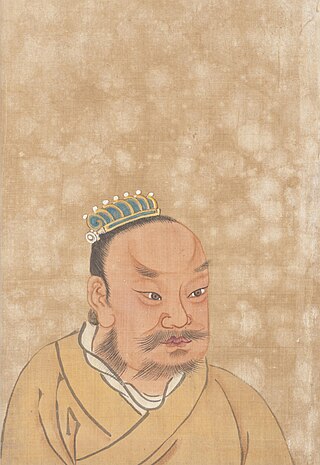
Xiang Ji,courtesy name Yu,was the Hegemon-King of Western Chu during the Chu–Han Contention period of China. A noble of the state of Chu,Xiang Yu rebelled against the Qin dynasty,destroying their last remnants and becoming a powerful warlord. He was granted the title of "Duke of Lu" (魯公) by King Huai II of the restoring Chu state in 208 BC. The following year,he led the Chu forces to victory at the Battle of Julu against the Qin armies led by Zhang Han. After the fall of Qin,Xiang Yu was enthroned as the "Hegemon-King of Western Chu" (西楚霸王) and ruled a vast area covering modern-day central and eastern China,with Pengcheng as his capital. He engaged Liu Bang,the founding emperor of the Han dynasty,in a long struggle for power,known as the Chu–Han Contention,which concluded with his eventual defeat at the Battle of Gaixia and his suicide. Xiang Yu is depicted in the Wu Shuang Pu by Jin Guliang.

Han Xin was a Chinese military general and politician who served Liu Bang during the Chu–Han Contention and contributed greatly to the founding of the Han dynasty. Han Xin was named as one of the "Three Heroes of the early Han dynasty",along with Zhang Liang and Xiao He.

After Liu Bang defeated Xiang Yu and proclaimed himself emperor of the Han dynasty,he followed the practice of Xiang Yu and enfeoffed many generals,noblemen,and imperial relatives as kings,the same title borne by the sovereigns of the Shang and Zhou dynasties and by the rulers of the Warring States. Each king had his own semi-autonomous kingdom. This was a departure from the policy of the Qin dynasty,which divided China into commanderies governed by non-hereditary governors.

The Man,commonly known as the Nanman or Southern Man,were ancient indigenous peoples who lived in inland South and Southwest China,mainly around the Yangtze River valley. In ancient Chinese sources,the term Nanman was used to collectively describe multiple ethnic groups,probably the predecessors of the modern Miao,Zhuang,and Dai peoples,and non-Chinese Sino-Tibetan groups such as the Jingpo and Yi peoples. It was an umbrella term that included any groups south of the expanding Huaxia civilization,and there was never a single polity that united these people,although the state of Chu ruled over much of the Yangtze region during the Zhou dynasty and was partly influenced by the Man culture.
Zhang Yi,courtesy name Junsi,was an official of the state of Shu Han in the Three Kingdoms period of China.
Huan Jie,courtesy name Boxu,was a Chinese official who lived during the late Eastern Han dynasty and served under the warlord Cao Cao. After the fall of the Eastern Han dynasty,he briefly served in the state of Cao Wei during the Three Kingdoms period.

LüKai,courtesy name Jiping,was an official of the state of Shu Han during the Three Kingdoms period of China.
Qin Lang,courtesy name Yuanming,was a military general of the state of Cao Wei during the Three Kingdoms period of China.
The Battle of Pengcheng was fought in Pengcheng in April 205 BC between the kingdoms of Western Chu and Han,led by Xiang Yu and Liu Bang respectively. The Han forces were unprepared and suffered heavy losses. Several of Liu Bang's family members were captured and some of his allies defected to Chu as a result of his defeat.
Zong Yu,courtesy name Deyan,was a military general and diplomat of the state of Shu Han during the Three Kingdoms period of China. Like Liao Hua and Zhang Yi,Zong was one of few officials who served the Shu-Han state throughout its entire existence.

Chen Ping was a Chinese politician who served as a chancellor in the early Western Han dynasty. He was an advisor to Liu Bang,the founding emperor of the Han dynasty. He played an important role in helping Liu Bang overcome his rival,Xiang Yu,in the Chu–Han Contention.
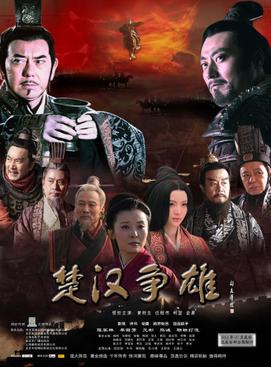
Chu Han Zhengxiong is a Chinese television series directed by Chen Jialin. The plot,based on the historical novel of the same Chinese title by Xiong Cheng (熊誠),retells the events in the Chu–Han Contention,an interregnum between the fall of the Qin dynasty and the founding of the Han dynasty. Shooting for the series started in October 2011 at the Jiaozuo Film and Television City. It was released in China on 27 November 2012.
Ying Bu was a Chinese military general,monarch,politician,and warlord who lived during the early Han dynasty. He was a native of Lu County. In his early life under the Qin dynasty,Ying Bu was convicted and sentenced to qing,so he was also called Qing Bu (黥布). He was then sent to Mount Li to perform hard labour by constructing Qin Shi Huang's mausoleum. He later escaped with some men and became the leader of a bandit gang. Ying Bu participated in the insurrection against the Qin dynasty after the Dazexiang Uprising broke out in 209 BC. After the uprising failed,he became part of a rebel force led by Xiang Liang. He assisted Xiang Liang's nephew and successor Xiang Yu in overthrowing the Qin dynasty. After the fall of Qin,he initially fought on Xiang Yu's side in the Chu–Han Contention,a power struggle for supremacy over China between Xiang Yu and Liu Bang. However,later,he defected to Liu Bang's side and helped Liu defeat Xiang Yu and become the emperor. During this period of time,Ying Bu held the title "King of Jiujiang". In c.August 203,Liu Bang appointed Ying Bu as a vassal king and granted him the title "King of Huainan". In 196 BC,Ying Bu rebelled against the Han dynasty but was defeated and killed.

The Changsha Kingdom was a kingdom within the Han Empire of China,located in present-day Hunan and some surrounding areas. The kingdom was founded when Emperor Gaozu granted the territory to his follower Wu Rui in 203 or 202 BC,around the same time as the establishment of the Han dynasty. Wu Rui and his descendants held the kingdom for five generations until Wu Zhu died without an heir in 157 BC. In 155 BC,the kingdom was reestablished for a member of the imperial family. However,the creation of this second kingdom coincided with the Rebellion of the Seven States and the subsequent reforms under Emperor Jing,and Changsha under the imperial family saw its autonomy greatly diminished. The kingdom was dissolved during Wang Mang's usurpation,briefly restored after the founding of the Eastern Han,and finally abolished in AD 33 and converted to a commandery under the imperial government.
References
- 1 2 Book of Han , Chapter 34.
- ↑ Li Daoyuan, Commentary on the Water Classic , citing Guo Ban (郭頒), Shiyu (《世語》):魏黃初末,吳人發芮冢取木,於縣立孫堅廟,見芮尸容貌衣物並如故。吳平后,與發冢人於壽春見南蠻校尉吳綱曰:“君形貌何類長沙王吳芮乎!但君微短耳。”綱矍然曰:“是先祖也。”